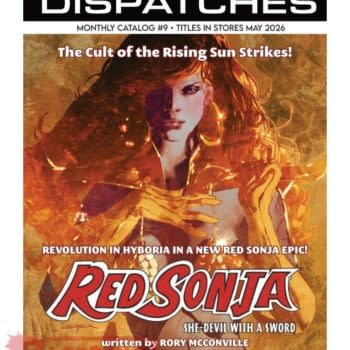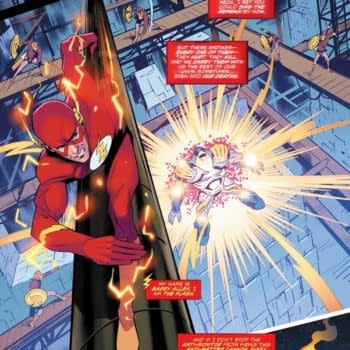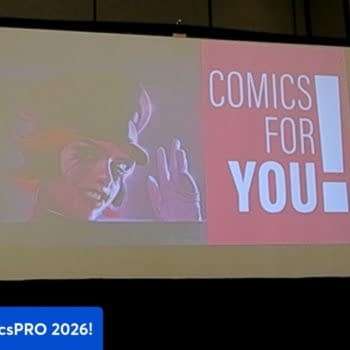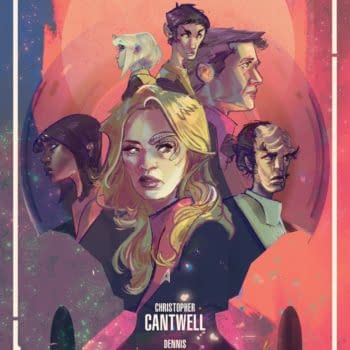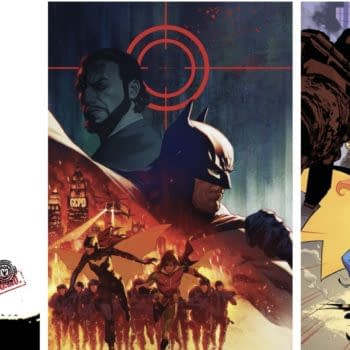Posted in: Comics | Tagged: alex de campi, alexis sergio, berliac, Comics, drawn & quarterly, graphic novels, howard chaykin, identity politics, image, image comics, lgbt, LGBTQ, Magdalene Visaggio, ogn, political correctness, pride month, sadbøi, sjw, social justice warriors, the divided states of hysteria, trans, transgender, transphobia, twitter
A Week In Transphobia In Comics
It's been an interesting first week of Pride Month for comics. Early in the week, in fact pretty much kicking it off, came news that Drawn & Quarterly had cancelled a book, Sadbøi, by artist Berliac due to a historic transphobic essay and comments that were brought to light.
Now, on new comic day of the first full week of Pride Month, Image Comics released Howard Chaykin's The Divided States of Hysteria, which it turned out contained a graphic, offensive depiction of trans panic violence on a trans sex worker.
None of this, sadly, is particularly new. Violence committed upon members of the trans community, and quite often portrayed as transgender sex workers, is a common trope in all media, not just comics. And sadly, transphobic remarks from creators isn't unheard of. But to have two significant cases in the same medium in such a short amount of time, and at such a time, is significant.
What may be handy to look at is how each situation was handled too.

Drawn & Quarterly, upon learning of the comments and Gay Jin essay by Berliac, cancelled the book and posted a statement profoundly apologising for what they admitted was their own failure, as due diligence in terms of investigating the writer and the historic work of the artist had not been adhered to. They accepted that they had made a mistake that offended and hurt people, and took action and apologised for it.
As for the artist, Berliac posted his own statement whereby he simultaneously admitted fault and painted himself as a victim of his upbringing, education in regards to gender politics and in general too. He also ended by condemning the culture of 'political correctness' as the cause of the outrage and upset.
Moving onto Image and Howard Chaykin, whose comic actually has a Pride Month variant that he created, when the content of the comic was brought to light by trans audiences and others on twitter last night, Image responded with a 'statement'. However, this 'statement', written by Chaykin, is in fact in the comic itself, explaining how such a response could have been crafted seemingly so quickly.
In it, Chaykin again takes aim at liberals, social justice warriors and identity politics as elements that must be grated against through the honest gritty truth of reality for us to move forward together, instead of being at each others throats, and lays blame for the United States position as it is now and President as it is now at the feet of those wishing to be treated with consideration and fairness, mentioning 'trigger warnings' and 'safe spaces' in particular.
As I mentioned, this statement was pre-prepared for publication in the comic itself. As such, it would seem Image Comics, whom it should be noted have changed their twitter avatar to include the rainbow flag, have seen no need to respond with a statement actually responding to the legitimate feelings of upset and anger caused by releasing a comic featuring such graphic trans assault in the first week on Pride Month.
In response to comics commentator Alexis Sergio, Alex de Campi laid out a few basic facts about how the Image model works.
It is also worth noting that Image Comics generally do put out quite a few titles that have a good bit of LGBTQ+ representation, if not a great deal of trans representation specifically, such as progressive titles like The Wicked + The Divine, Sex Criminals, Saga, Paper Girls, Bitch Planet and Rat Queens, to name a few.
However, one might argue they are not be the most diverse in terms of actual creators. This is not a specific arrow aimed at Image, to be sure, as the comics medium as a whole is not the most diverse, though some publishers are making efforts to change that. However, as the model of Image Comics works and as de Campi points out, it is not generally the most ideal place for new, unknown talent. In most cases, creative talent has already built a name for themselves elsewhere, often Marvel or DC, allowing them to bring potential audiences to their creator owned works under Image. As such, it often relies on artists and writers who have already broken into the Big Two, and whilst there are efforts to expand diversity there, certainly with Image Comics centrally published titles, the majority of talent with established names are still largely white, cis, heterosexual men.
There are of course notable exceptions to these suppositions, but as they say, exceptions prove the rule.
And yet Image do publish inclusive titles. They have made efforts to recognise Pride Month with their Pride variant covers, which is more than most other publishers have done. However, they have not seen fit to actually respond to the anger caused by the issue, nor did they think it prudent to at the very least have held off publication of this title until after Pride Month. With one of the most common responses in support of The Divided States of Hysteria being freedom of speech, it is worth noting how this is a two-way street – if they have the freedom to create and publish it, we also have the freedom to call it transphobic, trash or voice our displeasure and anger.
After all, this tired trope is all too common for the trans community.
So what options are there? Perhaps Magdalene Visaggio puts it best.












